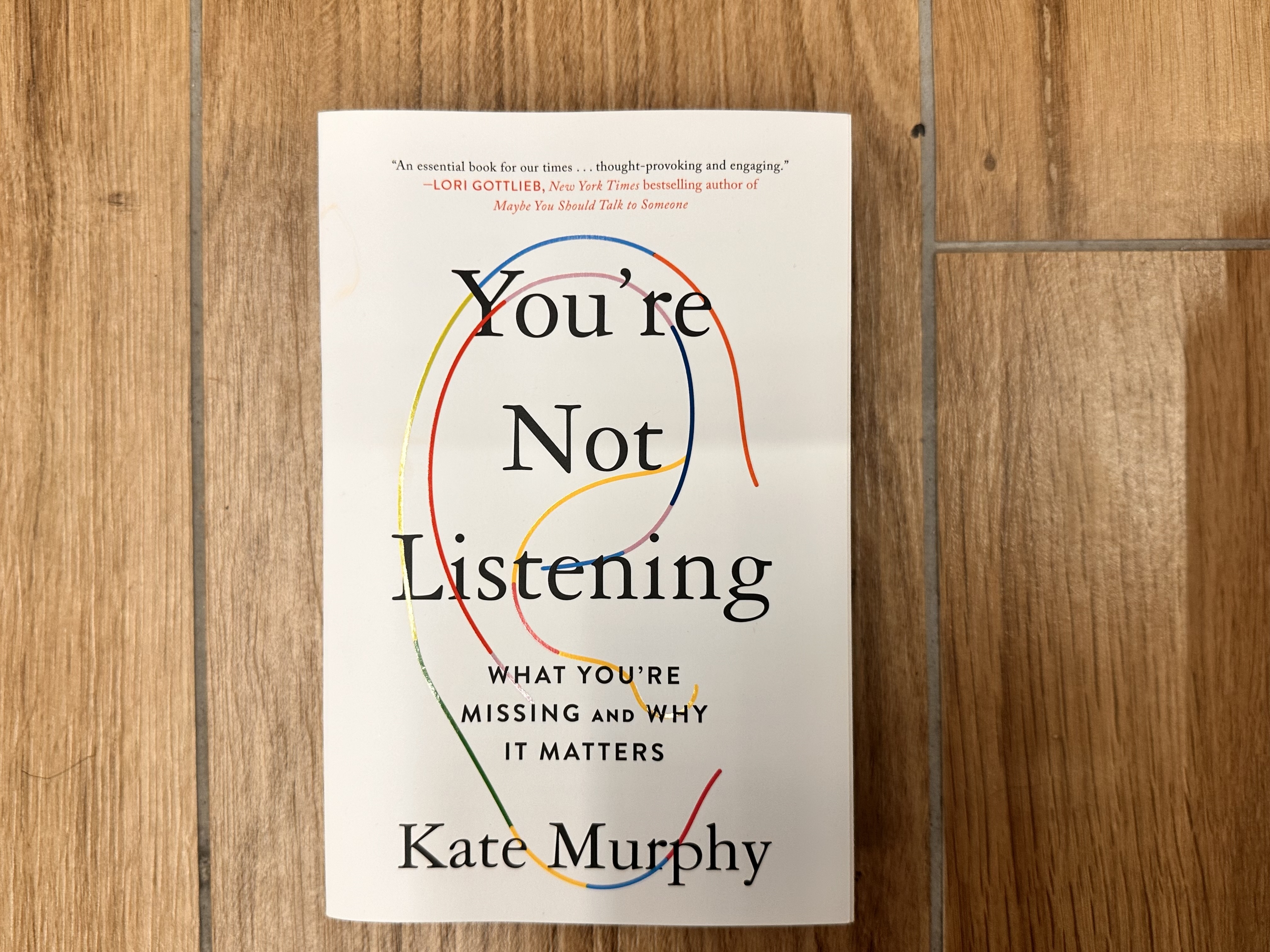Listening Matters: Why We’re Not Listening—and Why It Matters

In today’s fast-paced, noisy world, it often feels like everyone is talking but no one is really listening. Kate Murphy’s book, You’re Not Listening: What You’re Missing and Why It Matters, explores the reasons behind this troubling trend and what we can do to become better listeners—ultimately leading to deeper, more meaningful connections with the people around us.
The Art of Listening—Lost?
Murphy argues that listening is a skill that has been overshadowed by our obsession with speaking, sharing, and asserting our own opinions. But as the book points out, listening is far more than just being quiet while the other person talks—it’s an active process of engagement and empathy that can transform our relationships, work lives, and society as a whole.
Why We’re Not Listening
Murphy delves into various reasons why people aren't listening anymore. She discusses how technology, particularly social media, has altered the way we communicate. We’re more focused on sharing our lives and opinions than on hearing from others. The constant distractions of notifications and multitasking have also led to a decrease in our ability to stay present in conversations.
What We’re Missing
By not listening, Murphy warns, we’re missing out on truly understanding the people around us. Whether it’s in personal relationships, workplace interactions, or even public discourse, failure to listen leads to misunderstandings, disconnection, and ultimately, a society where people feel unheard and isolated.
The Science of Listening
Murphy backs her claims with fascinating research on the science of listening, discussing how it affects our brains and mental well-being. Studies show that people who feel heard are more satisfied in their relationships and have better emotional health. Listening activates different areas of the brain that foster connection and empathy, helping us form bonds and navigate complex social dynamics.
How to Become a Better Listener
The book isn’t just about diagnosing the problem; it also offers actionable advice for improving our listening skills. Murphy encourages readers to:
Be curious: Ask thoughtful questions and show genuine interest in the answers.
Be present: Put away distractions and give your full attention to the speaker.
Be patient: Avoid interrupting or rushing someone to finish speaking. Give people the space to express themselves fully.
Reflect back: Paraphrasing or reflecting on what someone has said helps show that you’re engaged and value their perspective.
Final Thoughts
You’re Not Listening is a timely reminder that while talking may feel powerful, real influence and connection come from our ability to listen. In a world where people often feel isolated and misunderstood, Murphy makes a compelling case for listening as a crucial, transformative tool for building empathy, trust, and stronger relationships.
If you’re looking to improve your communication skills, deepen your connections, or simply want to become more present in your conversations, this book is a must-read.
The Art of Listening—Lost?
Murphy argues that listening is a skill that has been overshadowed by our obsession with speaking, sharing, and asserting our own opinions. But as the book points out, listening is far more than just being quiet while the other person talks—it’s an active process of engagement and empathy that can transform our relationships, work lives, and society as a whole.
Why We’re Not Listening
Murphy delves into various reasons why people aren't listening anymore. She discusses how technology, particularly social media, has altered the way we communicate. We’re more focused on sharing our lives and opinions than on hearing from others. The constant distractions of notifications and multitasking have also led to a decrease in our ability to stay present in conversations.
What We’re Missing
By not listening, Murphy warns, we’re missing out on truly understanding the people around us. Whether it’s in personal relationships, workplace interactions, or even public discourse, failure to listen leads to misunderstandings, disconnection, and ultimately, a society where people feel unheard and isolated.
The Science of Listening
Murphy backs her claims with fascinating research on the science of listening, discussing how it affects our brains and mental well-being. Studies show that people who feel heard are more satisfied in their relationships and have better emotional health. Listening activates different areas of the brain that foster connection and empathy, helping us form bonds and navigate complex social dynamics.
How to Become a Better Listener
The book isn’t just about diagnosing the problem; it also offers actionable advice for improving our listening skills. Murphy encourages readers to:
Be curious: Ask thoughtful questions and show genuine interest in the answers.
Be present: Put away distractions and give your full attention to the speaker.
Be patient: Avoid interrupting or rushing someone to finish speaking. Give people the space to express themselves fully.
Reflect back: Paraphrasing or reflecting on what someone has said helps show that you’re engaged and value their perspective.
Final Thoughts
You’re Not Listening is a timely reminder that while talking may feel powerful, real influence and connection come from our ability to listen. In a world where people often feel isolated and misunderstood, Murphy makes a compelling case for listening as a crucial, transformative tool for building empathy, trust, and stronger relationships.
If you’re looking to improve your communication skills, deepen your connections, or simply want to become more present in your conversations, this book is a must-read.

